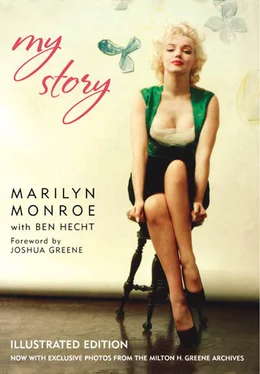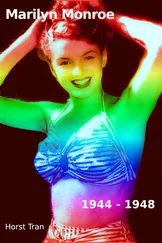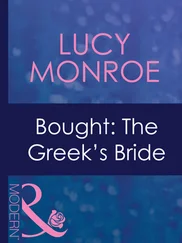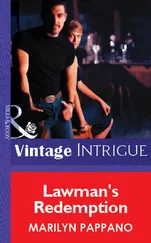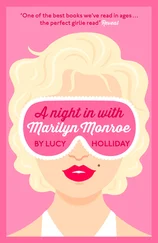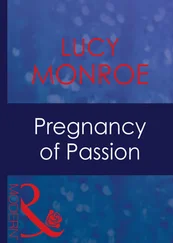One of the reasons I accepted the job was that I thought it would make my lover realize how much he loved me—if I went away for a few weeks. He didn’t seem to be able to realize it with me hanging around twenty-four hours a day. I had read that men love you more if they can be made a little uncertain about owning you. But reading something is one thing, doing it is quite another. Besides, I could never pretend to feel something I didn’t feel. I could never make love if I didn’t love, and if I loved I could no more hide the fact than change the color of my eyes.

The day before I left for New York to start the Love Happy exploitation tours of the U.S.A. I suddenly realized that I had almost no wardrobe. I called on Mr. Cowan and told him about this.
“I won’t be much of an advertisement in one old suit,” I said.
Mr. Cowan smiled and agreed I had better have a larger wardrobe. He gave me seventy-five dollars to outfit myself for the tour. I rushed over to the May Company store and bought three woolen suits for twenty-five dollars apiece.
I bought the woolen suits because I remembered that New York and Chicago were in the North. I had seen them in the movies blanketed with snow. In my excitement over going to see these great cities for the first time I forgot it was summertime there as well as in Los Angeles.
On the way to New York I made plans of all the things I would see.
My lover had always said, one of the reasons you have nothing to talk about is you’ve never been anywhere or seen anything.
I was going to remedy that.
When the train stopped in New York I could hardly breathe, it was so hot. It was hotter than I had ever known it to be in Hollywood. The woolen suit made me feel as if I was wearing an oven.
Mr. Cowan’s press agent, who was supervising my exploitation trip, rose to the situation.
“We must make capital out of what we have,” he explained. So he arranged for me to pose on the train steps with perspiration running down my face and an ice cream cone in each hand.
The caption for the pictures read: “Marilyn Monroe, the hottest thing in pictures, cooling off.”
That “cooling off” idea became sort of the basis for my exploitation work.
A half hour after arriving in New York I was led into an elegant suite in the Sherry-Netherland Hotel and told to put on a bathing suit.
More photographers arrived and took more pictures of me “cooling off.”
I spent several days in New York looking at the walls of my elegant suite and the little figures of people fifteen stories below. All sorts of people came to interview me, not only newspapers and magazine reporters but exhibitors and other exploitation people from United Artists.
I asked questions about the Statue of Liberty and what were the best shows to see and the most glamorous cafés to go to. But I saw nothing and went nowhere.
Finally I got so tired of sitting around perspiring in one of my three woolen suits, that I complained.
“It seems to me,” I said to the United Artists’ representatives who were having dinner with me in my suite, “that I ought to have something more attractive to wear in the evening.”
They agreed and bought me a cotton dress at a wholesale shop. It had a low-cut neck and blue polka dots. They explained, also, that cotton was much more chic in the big cities than silk. I did like the red velvet belt that came with it.
The next stop was Detroit, and then Cleveland, Chicago, Milwaukee, and Rockford. It was the same story in each of them. I was taken to a hotel, rushed into a bathing suit, given a fan and photographers arrived. The hottest thing in pictures was cooling off again.
In Rockford I decided that I had seen enough of the world. Also, due to my moving around continually and to the confusion this seemed to arouse in Mr. Cowan’s bookkeeping department, I had not received any salary whatsoever. The salary, it was explained to me, would be waiting for me at the next stop. As a result I didn’t have fifty cents to spend on myself during my grand tour.
After sitting in the lobby of a Rockford movie theater, “keeping cool” in a bathing suit and handing out orchids to “my favorite male moviegoers” I told the press agent that I would like to return to Hollywood.
The tour, in a way, was a failure. When I got back I didn’t seem to have any more to talk about than before. And absence didn’t seem to have made my friend’s heart grow any fonder.
One day I was sitting in an office of the William Morris Agency. A very short man was behind a large desk. He was talking to me in a quiet voice and looking at me with kind eyes. He was John Hyde, one of the most important talent scouts in Hollywood. Everyone called him Johnny Hyde because of the friendly look he had for everyone.
“You’re going to be a great movie star,” Johnny Hyde said to me. “I know. Many years ago I discovered a girl like you and brought her to Metro—Lana Turner. You’re better. You’ll go farther. You’ve got more.”
“Then why can’t I get a job?” I asked. “Just to make enough money to eat on.”
“It’s hard for a star to get an eating job,” said Johnny Hyde. “A star is only good as a star. You don’t fit into anything less.”
I laughed for the first time in months. Johnny Hyde didn’t laugh with me. He kept looking at me, and looking.
“Yes,” he said, “it’s there. I can feel it. I see a hundred actresses a week. They haven’t got what you have. Do you know what I’m talking about?”
“Yes,” I said. “I used to feel it myself once. When I was a kid, when I first started. But I haven’t felt it for some time now. I’ve been too busy having troubles.”
“Love trouble?” he said.
I said, “Yes.”
“Come around tomorrow, and we’ll talk again,” said Johnny Hyde.
I had made another friend, a woman who was the head of M.G.M. talent scout department. Her name was Lucille Ryman.
Miss Ryman had not only been kind to me and loaned me money and things to wear, but she had also assured me I was going to be a star.
One day Miss Ryman called me up.
“There’s a part for you in John Huston’s picture The Asphalt Jungle that’s perfect for you,” she said. “It’s not a big part, but you’ll be bound to make a big hit in it. Tell your agent to get in touch with Mr. Huston. I’ve already discussed you with him.”
Johnny Hyde brought me to Mr. Huston’s office. Arthur Hornblow, the producer of the picture, was also present.
Mr. Huston was an exciting looking man. He was tall, long-faced, and his hair was mussed. He interrupted everybody with outbursts of laughter as if he were drunk. But he wasn’t drunk. He was just happy for some mysterious reason, and he was also a genius—the first I had ever met.
I had met Mr. Zanuck, of course, who was also widely regarded as a genius. But he was a different type of genius—the genius of being in a position to give orders to everybody in a studio. In Hollywood this type of genius is the most highly esteemed and makes the most money. But, in a way, it is not genius at all. It’s more having the best job—and the best people working for you.

Mr. Huston gave me a copy of the script. Unlike Mr. Zanuck, he did not believe that actresses shouldn’t be allowed to know what they were going to act in. I took it home and my friend Natasha Lytess agreed to coach me.
Читать дальше
